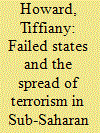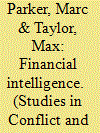|
|
|
Sort Order |
|
|
|
Items / Page
|
|
|
|
|
|
|
| Srl | Item |
| 1 |
ID:
099823


|
|
|
|
|
| Publication |
2010.
|
| Summary/Abstract |
Plagued by systematic state failure, sub-Saharan Africa's failed states have helped facilitate internationally sponsored terrorist networks and operations. However, until recently, this type of activity was primarily relegated to North Africa and the Horn. But that has begun to change. Now, what was once a seemingly benign terrorist presence in sub-Saharan Africa is starting to transform into a movement, with states such as Nigeria, Sierra Leone, Liberia, and the Democratic Republic of the Congo (DRC) now lending arms, financial support, and radical militants to the extremist jihadist movement of internationally sponsored terrorist organizations such as Al Qaeda. Further, with the recent bombings in Kenya and Somalia, and the failed bombing attempt on a U.S. airliner by a Nigerian national, it is becoming increasingly evident that internationally sponsored terrorist networks have found a permanent home in sub-Saharan Africa and within the hearts and minds of its people, which poses significant challenges for the international community, given the region's patchwork of failed states, where terrorists can easily hide and thrive. Consequently, this study discusses how the conditions of state failure have fostered support for internationally sponsored terrorism in sub-Saharan Africa. Terrorist groups are now actively recruiting more militants from within the region and popular support for extremist acts is on the rise in sub-Saharan Africa. Thus, the article argues sub-Saharan Africa will soon become the site for the next generation of terrorists, and the next wave of terrorist activity.
|
|
|
|
|
|
|
|
|
|
|
|
|
|
|
|
| 2 |
ID:
099822


|
|
|
|
|
| Publication |
2010.
|
| Summary/Abstract |
The harvesting of financial intelligence by law enforcement and intelligence services through various forms of surveillance is now so prevalent that it has become a core feature of contemporary security practice. Not surprisingly, concerns have been raised regarding the intrusive nature of financial intelligence collection and the emerging challenges posed to liberty. This article, whilst written primarily from a UK perspective, considers the trade-offs that inevitably emerge when liberty and security collide. Above all it argues that such measures are a necessary consequence of a changing security environment and that effective counter measures inevitably come at a price. The value added from data surveillance by the state, when lawfully sanctioned, audited and regulated are in the interests of public safety and national security, deemed a price worth paying.
|
|
|
|
|
|
|
|
|
|
|
|
|
|
|
|
| 3 |
ID:
099824


|
|
|
|
|
| Publication |
2010.
|
| Summary/Abstract |
Jemaah Islamiyah (JI) has shifted its structure and strategies several times since its inception, and its ability to evolve over time has ensured its survival. This article evaluates the evolution of JI's influence in Indonesia and its shift in strategy, in an attempt to address the broader issue of its survival as an organization. It hypothesizes that while internal factors initiated the current strategy shift to an ideological and political focus, external factors have successfully exploited and solidified that shift. Explaining JI's historical evolution in four phases, it concludes by considering possibilities for a "fifth phase" of peaceful political participation.
|
|
|
|
|
|
|
|
|
|
|
|
|
|
|
|
| 4 |
ID:
099825


|
|
|
|
|
| Publication |
2010.
|
| Summary/Abstract |
This study presents state police agencies' perceptions about three significant terrorism issues on which there is little empirical research. All three issues have significant implications for understanding the role of state police agencies in responding to terrorism threats. First, the authors investigated whether the respondents believed that supporters of specified extremist movements tended to commit crimes as lone wolves, with others, or both alone and with others. Second, they were asked to provide data to gauge how often far-right extremists committed 13 crime types that varied in magnitude and motivation. Third, they were asked if they had knowledge about whether far-right extremists and Islamic jihadists had cooperated to commit crimes. These data were collected by surveying the 50 state police agencies in the United States. The results indicate that state police officials are concerned with both group and lone-wolf activities. Importantly, there was variation in the potential for lone-wolf crimes when comparing different types of extremist movements. The results indicate that far-right extremists are involved in a range of terrorist, preparatory, and routine criminal activities, but this involvement varies by region. Two state police agencies also indicated that they knew of Islamic and far-right collaboration. The study identified two other instances of direct collaboration and a number of other interesting cases through open source searches. The article concludes with a discussion of the policy implications of the findings and outlines directions for future research.
|
|
|
|
|
|
|
|
|
|
|
|
|
|
|
|
|
|
|
|
|